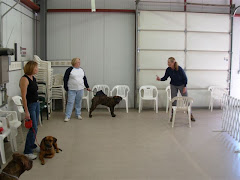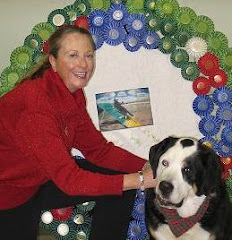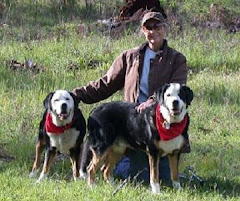Too much of a good thing? For years I've been telling dog-training students to spend more time with their dogs...but it is entirely possible to spend TOO MUCH time with them, creating an unhealthy co-dependency that turns into destructive behavior.
Lizzie and I have been nearly inseparable during the year she's been with Don and me. I've had the luxury of taking my dog to work, and spending plenty of time with her at home.
Ironically, I haven't done her any favors by providing her with so much of my time.
Now, when I leave the house, I'm likely to find a mess when I return...like this pheasant. Or the torn-up sofa cushion. Or that fancy silicone baking sheet she stole off the counter, dragged out the doggy door, and shredded.
Destructive behavior like this doesn't make a dog "bad." In fact, there's no sense in scolding the dog once you find the damage. The only recourse is to re-program the dog...to alleviate some of the stress of separation. If my dog can't stand to be away from me, I've obviously made some mistakes in how I've raised her. I have unwittingly created a clingy, insecure, manipulative dog who lacks the emotional strength to survive without me, her "support system." Destructive behaviors, like chewing, become an outlet for her stress.
Now, Lizzie's situation isn't as dire as I make it sound...but it can explain why YOUR dog may suffer from destructive separation anxiety from you. We tend to make our pets so emotionally dependent on us because we actually nurture them TOO MUCH. So here's what I'm going to do with Lizzie, to put some "distance" between her and me, and thus help her deal with the times when I'm not with her.
1. I won't pet her or even acknolwedge her every time she comes up to me. This will be hard! Not only do I like to pet her, but it's an absent-minded habit to reach a hand down to her when she comes to me, even if I'm talking on the phone or working on the computer. I must remind myself I'm doing it in her best interest!
2. I won't make a big deal out of coming home or leaving. I'll scarcely say hello or goodbye. If I make it a heavy emotional scene, I 'd be ramping up her own emotional stress.
Ironically, I haven't done her any favors by providing her with so much of my time.
Now, when I leave the house, I'm likely to find a mess when I return...like this pheasant. Or the torn-up sofa cushion. Or that fancy silicone baking sheet she stole off the counter, dragged out the doggy door, and shredded.
Destructive behavior like this doesn't make a dog "bad." In fact, there's no sense in scolding the dog once you find the damage. The only recourse is to re-program the dog...to alleviate some of the stress of separation. If my dog can't stand to be away from me, I've obviously made some mistakes in how I've raised her. I have unwittingly created a clingy, insecure, manipulative dog who lacks the emotional strength to survive without me, her "support system." Destructive behaviors, like chewing, become an outlet for her stress.
Now, Lizzie's situation isn't as dire as I make it sound...but it can explain why YOUR dog may suffer from destructive separation anxiety from you. We tend to make our pets so emotionally dependent on us because we actually nurture them TOO MUCH. So here's what I'm going to do with Lizzie, to put some "distance" between her and me, and thus help her deal with the times when I'm not with her.
1. I won't pet her or even acknolwedge her every time she comes up to me. This will be hard! Not only do I like to pet her, but it's an absent-minded habit to reach a hand down to her when she comes to me, even if I'm talking on the phone or working on the computer. I must remind myself I'm doing it in her best interest!
2. I won't make a big deal out of coming home or leaving. I'll scarcely say hello or goodbye. If I make it a heavy emotional scene, I 'd be ramping up her own emotional stress.
3. I'll babble less, thus making my specific spoken words to her mean more. When I do request something of her, I'll be ready to enforce it.
4. I'll arbitrarily "crate" her. No explanations, no apologies. Sometimes I'll leave, sometimes I won't. She must be able to adapt to "random events."
5. I'll make sure she's physically worn down before I do have to leave her. A long walk and/or a rousing game of fetch or frisbee will take the edge off her energy level, leaving her able to relax in my absence.
6. I'll make our separations more pleasant by reserving SPECIAL toys (like stuffed Kongs) for times when we are apart.
4. I'll arbitrarily "crate" her. No explanations, no apologies. Sometimes I'll leave, sometimes I won't. She must be able to adapt to "random events."
5. I'll make sure she's physically worn down before I do have to leave her. A long walk and/or a rousing game of fetch or frisbee will take the edge off her energy level, leaving her able to relax in my absence.
6. I'll make our separations more pleasant by reserving SPECIAL toys (like stuffed Kongs) for times when we are apart.
7. Doggy Day Care will become part of her weekly experience. It'll allow her to be a dog, with her peers, away from me for several hours a week.
Make sure your dog is emotionally equipped for those inevitable times when you won't or can't be there. Whether it's jury duty, a hospital stay, or an unanticipated trip out of town, your constant companion must be able to live life without you, and without feeling separation anxiety that manifests itself in destructive behaviors.


















1 comment:
Awesome! I was just going to ask you what should we do with our NEW 2 yr old adopted black lab who gets into everything when we leave the house. She even pulls dishes out of the sink, opens cubbards and gets stuff out. We have had to babt proof the house which really upsets me, because we have never had to do this before with any of our dogs. I think our new adopted dog has come with lots of negative baggage. I love your list of things to do to help. Dana Gonzales
Post a Comment